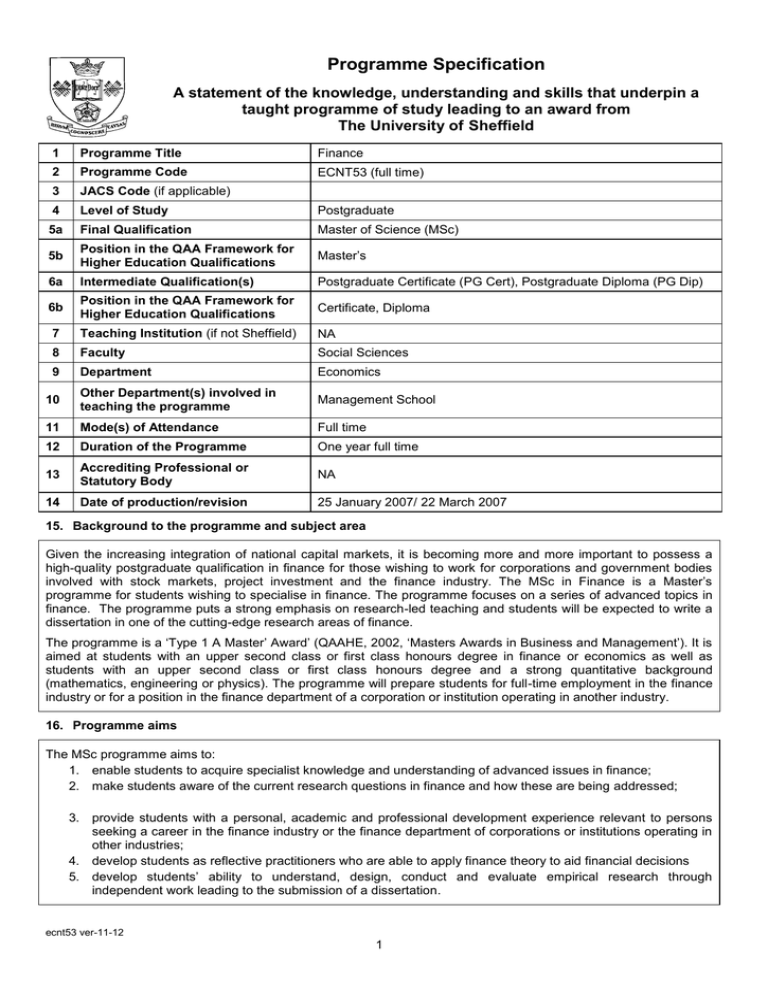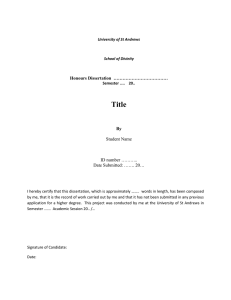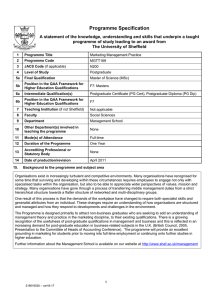Programme Specification
advertisement

Programme Specification A statement of the knowledge, understanding and skills that underpin a taught programme of study leading to an award from The University of Sheffield 1 Programme Title Finance 2 Programme Code ECNT53 (full time) 3 JACS Code (if applicable) 4 Level of Study Postgraduate 5a Final Qualification Master of Science (MSc) 5b Position in the QAA Framework for Higher Education Qualifications Master’s 6a Intermediate Qualification(s) Postgraduate Certificate (PG Cert), Postgraduate Diploma (PG Dip) 6b Position in the QAA Framework for Higher Education Qualifications Certificate, Diploma 7 Teaching Institution (if not Sheffield) NA 8 Faculty Social Sciences 9 Department Economics 10 Other Department(s) involved in teaching the programme Management School 11 Mode(s) of Attendance Full time 12 Duration of the Programme One year full time 13 Accrediting Professional or Statutory Body NA 14 Date of production/revision 25 January 2007/ 22 March 2007 15. Background to the programme and subject area Given the increasing integration of national capital markets, it is becoming more and more important to possess a high-quality postgraduate qualification in finance for those wishing to work for corporations and government bodies involved with stock markets, project investment and the finance industry. The MSc in Finance is a Master’s programme for students wishing to specialise in finance. The programme focuses on a series of advanced topics in finance. The programme puts a strong emphasis on research-led teaching and students will be expected to write a dissertation in one of the cutting-edge research areas of finance. The programme is a ‘Type 1 A Master’ Award’ (QAAHE, 2002, ‘Masters Awards in Business and Management’). It is aimed at students with an upper second class or first class honours degree in finance or economics as well as students with an upper second class or first class honours degree and a strong quantitative background (mathematics, engineering or physics). The programme will prepare students for full-time employment in the finance industry or for a position in the finance department of a corporation or institution operating in another industry. 16. Programme aims The MSc programme aims to: 1. enable students to acquire specialist knowledge and understanding of advanced issues in finance; 2. make students aware of the current research questions in finance and how these are being addressed; 3. provide students with a personal, academic and professional development experience relevant to persons seeking a career in the finance industry or the finance department of corporations or institutions operating in other industries; 4. develop students as reflective practitioners who are able to apply finance theory to aid financial decisions 5. develop students’ ability to understand, design, conduct and evaluate empirical research through independent work leading to the submission of a dissertation. ecnt53 ver-11-12 1 The aims of the PG Certificate in Finance are the same as aims 1, 2, and 3 above, except that the opportunities to gain breadth of knowledge and understanding would be significantly reduced. The aims of the PG Diploma in Finance are the same as aims 1-5 above. However, the opportunities under aims 4 and 5 would be reduced by the absence of completion of the dissertation. 17. Programme learning outcomes Knowledge and understanding: On successful completion of the PG Certificate in Finance, students will be able to demonstrate a critical understanding of knowledge related to: K1 the theory, principles and practice of finance; K2 contemporary issues in finance research; In addition to the above, on successful completion of the PG Diploma in Finance, students will be able to demonstrate critical understanding of knowledge related to: K3 the ability to perform a critical evaluation of the research design used in existing research in finance; K4 the main research methods – including statistical, econometric and mathematical techniques – relevant to empirical finance, their applications and their limitations. In addition to the above, on completion of the MSc in Finance, students will be able to demonstrate: K5 an advanced knowledge and critical understanding, displaying originality, depth and insight, of an area of study relevant to the field of finance. Skills and other attributes: On completion of the PG Certificate and PG Diploma in Finance, students will be able to demonstrate ability to: S1 identify and use relevant information for financial decision making; S2 analyse issues and problems relating to finance using the appropriate theories, concepts and techniques; S3 apply creative and critical methods of evaluation in the context of financial decisions and problems. S4 perform professional and personal skills (including analytical skills and the knowledge of financial databases) relevant to financial practice. In addition to the above, on successful completion of the MSc in Finance, students will be able to demonstrate the ability to: S5 complete an independent research study in a specific area of empirical finance, involving the skills of designing a research study, performing a critical review of the relevant existing research, choosing the appropriate research methodology, conducting data collection and analysing the findings in a systematic way, leading to the production of a written report of the dissertation which takes into account implications at the theoretical and practical levels. 18. Teaching, learning and assessment Development of the learning outcomes is promoted through the following teaching and learning methods: Lectures will adopt a flexible format consisting of traditional lectures and seminars. Traditional lectures will be used to create subject-specific knowledge and understanding, to guide the students’ learning experience and to stimulate critical reflection. Seminars will enable students to develop their understanding of the subject matter via interaction between the students and the teaching staff. These are used to support study within modules on the taught programme as well as research towards the dissertation. Web-sites and handouts will provide questions, activities, and examples to enhance students’ understanding and to promote critical reflection of the linkages between theory and practice. Tutor and self-directed private study and preparation for coursework assessment constitute a significant component of each student’s personal development. The following table demonstrates how these methods relate to the learning outcomes. ecnt53 ver-11-12 2 K1 K2 K3 K4 K5 S1 S2 S3 S4 S5 Lectures Seminars Web-sites & handouts Private study Opportunities to demonstrate achievement of the learning outcomes are provided through the following assessment methods: Examinations are used to test knowledge and understanding of the theories, concepts, principles and empirical research in finance. Essays and reports are used to test students’ knowledge and understanding of theoretical issues, to provide students with opportunities to apply the theoretical concepts in practice (e.g. via data applications) and to enable them to acquire a critical understanding of existing empirical research. The dissertation is used to test S4. The learning outcomes are assessed in the following ways: K1 K2 K3 K4 K5 K6 K7 S1 S2 S3 Examinations Essays & reports Dissertation 19. Reference points The learning outcomes have been developed to reflect the following points of reference: The University of Sheffield Mission Statement; The University of Sheffield Learning and Teaching Strategy; The Management School Learning and Teaching Strategy; The Quality Assurance Agency (QAA) Subject Benchmark Statement for Masters Awards in Business and Management; The Masters level qualification descriptor within the QAA Framework for Higher Education Qualifications. 20. Programme structure and regulations The programme for the MSc in Finance has 105 credits of core taught units and 15 credits to be chosen from a list of 3 15-credit units. The dissertation counts for 60 credits. Students may only proceed to the dissertation stage with the permission of the board of examiners. The board will need to be satisfied, based on the results from the taught part of the programme, that a student has a good chance of completing a satisfactory dissertation. In the first semester, students will take 4 core units of fifteen credits each covering the topics of modern finance, quantitative methods, raising capital and macroeconomic analysis. In the second semester, students will take 3 core units of fifteen credits each covering advanced issues in asset pricing and monetary economics. They will also have to choose one of two econometric units and another unit from a list of optional units covering topics such as development finance, international money and finance. ecnt53 ver-11-12 3 Over the summer, they will work on their dissertation (60 credits). A candidate who has been awarded sixty credits in respect of taught units shall be eligible for the award of the Postgraduate Certificate in Finance (MGTT132). A candidate who has been awarded one hundred and twenty credits in respect of taught units shall be eligible for the award of the Postgraduate Diploma in Finance (MGTT130). Part-time candidates will be expected to complete the MSc in 27 months. They will take taught units to the value of sixty credits from the first semester and second semester in Year One. In Year Two, they will take taught units not already taken to the value of eighty credits as well as work on their sixty-credit dissertation. Detailed information about the structure of programmes, regulations concerning assessment and progression and descriptions of individual modules are published in the University Calendar available on-line at www.shef.ac.uk/calendar 21. Student development over the course of study The first semester, the Certificate stage, focuses on developing students’ professional skills, improve their understanding of financial theory and improve their knowledge of the quantitative skills and estimation techniques relevant to finance. The second semester, the Diploma stage, enables students to integrate the knowledge and skills acquired during the first semester and to develop their understanding of more advanced topics in finance. The Master’s stage enables students to demonstrate their ability to undertake an empirical investigation of a timely issue in finance, drawing on relevant aspects of the knowledge, understanding and skills acquired during the two previous stages. The main output of the Master’s stage is a dissertation which allows the students to focus on one particular area of finance and to obtain in-depth understanding of the appropriate methodology. 22. Criteria for admission to the programme Applicants are required to hold a first class or high upper second-class honours degree – with a strong analytical and quantitative content – e.g. finance or economics. Applicants with a first class or high upper second-class honours degree in mathematics, engineering or physics may also be allowed onto the programme. Students whose first language is not English will need to take an English test to prove their language proficiency. We require a minimum score of 7.0 (with no individual element below 6.0) for IELTS, 623 for the paper-based TOEFL, 263 for the computerbased TOEFL and 106-108 for the internet-based TOEFL. 23. Additional information None This specification represents a concise statement about the main features of the programme and should be considered alongside other sources of information provided by the teaching department(s) and the University. In addition to programme specific information, further information about studying at The University of Sheffield can be accessed via our Student Services web site at www.shef.ac.uk/ssid. ecnt53 ver-11-12 4



